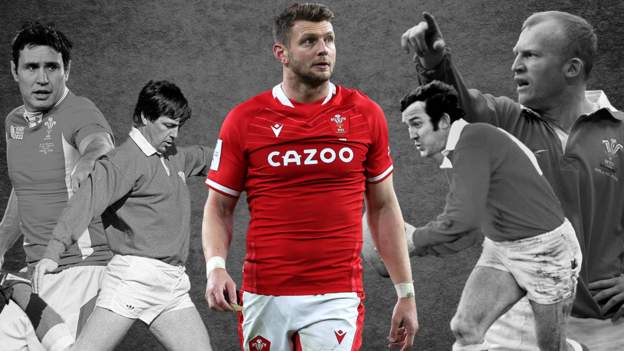
| Venue: Principality Stadium, Cardiff Date: Saturday, 19 March Kick-off: 14:15 GMT |
| Coverage: Watch live on BBC One, BBC iPlayer and online from 13:45 GMT; listen on BBC Radio 5 live sports extra, BBC Radio Wales and BBC Radio Cymru; text commentary on BBC Sport website and mobile app. |
For all its fabled lustre, the Wales number 10 shirt can weigh heavy on the shoulders of those who wear it.
The jersey’s history and symbolism can be empowering, but the scrutiny that comes with it can be overwhelming.
Barry John was a genius of a fly-half, for some the greatest, and yet even the man known as the King could not bear the constant glare of a demanding Welsh rugby public and retired at 27.
His successor Phil Bennett was another maestro, a Lions captain and playmaker extraordinaire. None of that mattered when he was dropped during Wales’ golden era of the 1970s.
Decades later, Neil Jenkins was criticised for not playing like John or Bennett despite being the world’s best kicker, while it took a move to France for Stephen Jones, a Test centurion, to be appreciated, and even then one could argue it was not appreciation enough.
“You have to develop your mental resilience,” says Jones. “It’s part and parcel of the number 10 jersey.
“You fully realise the responsibility that goes with that when you play for Wales.”
Jones’ team-mate James Hook – a dazzling talent and another Lion – had a similar experience, while Rhys Priestland sought the help of a psychologist after one particularly turbulent autumn.
These are all fine players in a long line of fly-halves who have represented Wales with distinction – but there is something about wearing 10 for this country which invites a special kind of pressure.
The man currently in possession of the shirt is Dan Biggar, who will make his 100th appearance for Wales in their final match of this year’s Six Nations against Italy on Saturday.
A Test Lion with almost 600 international points to his name, Biggar’s numbers only hint at his contribution to the canon of Welsh fly-halves.
And yet however successful he has been with Wales – from Grand Slams to World Cup semi-finals – Biggar has always had his detractors, those who believe he is too pragmatic, too sensible. You can never please everyone, Biggar has noted with a wry smile.
At 32 years old and with 99 caps to his name, Biggar has been around long enough to know this comes with the territory as Wales’ number 10.
As he has often said himself, he is not Barry John. Biggar is built differently, a world-class kicker and a warrior who throws himself into tackles as willingly as he barks orders at his backs.
That is not enough for some. Those who pine for the carefree rugby of bygone amateur eras can become consumed by nostalgia, blind to the qualities of the incumbent fly-half.
And it is not that Biggar merely takes the criticism in his stride or ignores it, he thrives on it.
“I’ve had it for 10 years and I’ve enjoyed the challenge of being written off,” he says. “In Wales, the number 10 always gets stick.”
Jones, now his backs coach for Wales, describes Biggar as “a winner”, a player who “every year evolves his game”.
Wales’ head coach Wayne Pivac says: “He’s a champion, isn’t he? He’s everything you want in a leader and a good number 10 in terms of managing and running the game.”
On the pitch, you will probably hear Biggar before you see him. When he is not demanding the highest standards from his team-mates, he is often in the referee’s ear.
Some misunderstand him. They see the abrasive competitor on the field and dismiss him as cocky or too mouthy. That perception could not be further from the truth.
Away from the heat of the contest, Biggar is considerate, approachable. He is generous with fans and an engaging interviewee, articulate and open.
Ask Biggar about anything and you will get an honest response, candid without being blunt. He is not interested in the platitudes that allow some of his peers to avoid certain questions, as he is not afraid to speak his mind.
Biggar will not hide behind a cliché and pretend he is not contemplating the significance of winning 100 caps for his country.
He is not going to use his intelligence to insult ours. It goes without saying that the team comes first and the result is of utmost importance – but moments like these matter.
“It will be very special. I’d be lying if I said I didn’t have it in my mind,” Biggar says.
“I got to 90 in last year’s Six Nations and I hadn’t given it too much thought but, when you get to that, it’s very difficult not to look towards getting to 100.
“It’s not been a countdown but it’s been a nice moment to get to and hopefully we can make the day really special for Al [Alun Wyn Jones] as well, for his achievement which is incredible.”
Biggar is happy to change the subject to his team-mate Jones, who will become the first player in the world to win 150 caps when Wales face Italy. The fly-half jokes that both players will be pleading with the other to lead the team out on to the pitch, eager to avoid the limelight.
It is because of Jones’ injury that Biggar has been Wales’ captain during this Six Nations, and it is a measure of the esteem in which he is held that the fly-half will retain the captaincy at the Principality Stadium on Saturday.
Whether it is him or Jones who leads the team out of the tunnel, Biggar will take a moment to savour the occasion before he takes to the field – as he did before his Lions Test debut last summer.
That was just a couple of months after the death of his mother Liz, his biggest supporter and the first person he would call on team selection day. She will be in his thoughts on Saturday, as will his wife Alex and son James in the stands.
This will be a moment for them to cherish as a family, and a chance for a nation to show its appreciation for Biggar. Wales is lucky to have him.
